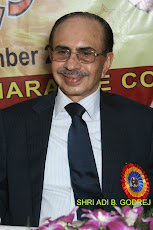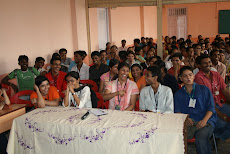A seminar was organised by The Economics Club in association with Lala Lajpatrai College of Economics and Commerce.
Dr. Nirupam
Bajpai addressed a gathering of economics and management students and
faculty from Colleges across Mumbai on ‘Challenges
of Sustainable Development in India and the Union Budget’ in an event
organised by The Economics Club, Mumbai
and Lala Lajpatrai College of Commerce & Economics on 22nd July 2014.
Sustainable development, Dr. Bajpai stated, has three
components ‘Growth’ (attaining and sustaining growth), ‘Inclusion / Equity’ and
‘Environmental Sustainability’.
Dr. Bajpai reminded the audience that India is still
largely dependent on agriculture and hence revival of agriculture is a top
priority. We need to revitalise Indian agriculture especially in large states like
Uttar Pradesh, whose dismal performance pulls down the national average. Various
Government initiatives in this area include:
- Focus on Laggard states
- Identify crops that need support
- Soil Health Cards for farmers
- Investment in Irrigation
Certain challenges facing the government include how it
deals with the Food Corporation and food inflation. How does one creatively
think of challenges like surplus stocks, wastage and hunger, asked Dr. Bajpai.
The ability to create jobs on a large scale will be
one of the parameters on which the success or failure of this government will
be evaluated. In the next five years, there is a need to create around 60 million
new jobs. While a lot of these jobs will come from the private sector, the
government has to allow and enable the private sector to create these jobs.
India needs to reform its archaic labour laws. Dr. Bajpai believes that action
on labour reforms will be initiated by the government in the coming two months.
Dr. Bajpai emphasised that India jumped the gun by
focussing on growth of the services sector before developing the manufacturing
sector. Growth in the services sector does not necessarily create jobs and he
hoped that structural changes in the economy will eventually happen.
Dr. Bajpai acknowledged that the current Finance
Minister has inherited problems from his predecessor and that a budget created
by the government in the first forty days of their rule can’t transform the
country overnight. Controlling the fiscal deficit will be a big challenge for
the finance minister. The fiscal deficit target is an ambitious target. India
needs huge investment volumes to increase revenues. In this context managing
expectations of different publics is critical for the government.
Some of the other points discussed:
ü
In the area of taxation Dr. Bajpai felt that retrospective
taxation should be scrapped as it sends out a negative signal to investors.
ü
FDI in defence manufacturing is a positive step
forward.
ü
Urbanisation too should be seen as an
opportunity and not a challenge.
ü
The impact of climate change is been felt across
the world. Climate change is disturbing hydrological cycles and patterns of
rainfall. What can individuals do for climate change? He urged students to
contribute towards conservation of energy by taking small steps like switching
off unnecessary lights and fans.
While discussing aspects of the Budget not agreeable
to him, Dr. Bajpai stated that investing in more IIMs and IITs in all states
without adequate resources to ensure quality with respect to faulty, leadership
and research was not a wise decision. Instead he feels that each state should
create centres of excellence in medicine, engineering and management. Dr.
Bajpai also felt that a bullet train is still a luxury and that the focus instead
should have been on improving existing trains or on investing in important
sectors like health or provision of safe drinking water.
Discussions during Q & A session:
ü
Rising defence expenditure is an indicator of
geo-political realities, stated Dr. Bajpai.
ü
When asked about the cleaning of Ganga, Dr.
Bajpai emphasised that what was needed above everything else was a change in
mindset of the people.
ü
Lack of political will is one of the key reasons
for problems faced in the power sector. He appreciated innovative ideas like
the use of solar panels over river Narmada to generate solar energy and prevent
evaporation!
ü
Addressing the need for a disaster management
plan, Dr. Bajpai emphasised that we need to create a mindset that values human
life.
ü
He warned the audiences that increasing poverty
could even lead to break down of a country. Hence the country needs to put in
around 10 to 15 years of concerted efforts to fight poverty.
ü
There is a need for investing in and improving
basic health care especially in rural India. Based on his experience with
health care projects across India, Dr. Bajpai believes that improvements in the
health care system can be carried out through well-thought out plans and
logistics.
ü
Within manufacturing he emphasised that we should
focus on agro-based industries. He also stressed the importance of investing in
R&D in agriculture.
ü
Creation of 100 smart cities was important.
ü
What India needs is out of the box thinking,
urged Dr. Bajpai.
Mr. A.K. Agarwala, Chairman, Business Review Council,
Aditya Birla Group then addressed the youth and urged to come ahead to make a
difference to society!
Mr. G. S. Panikar President of The Club ended the day
by thanking Dr. Bajpai for a wonderful and inspiring session.










